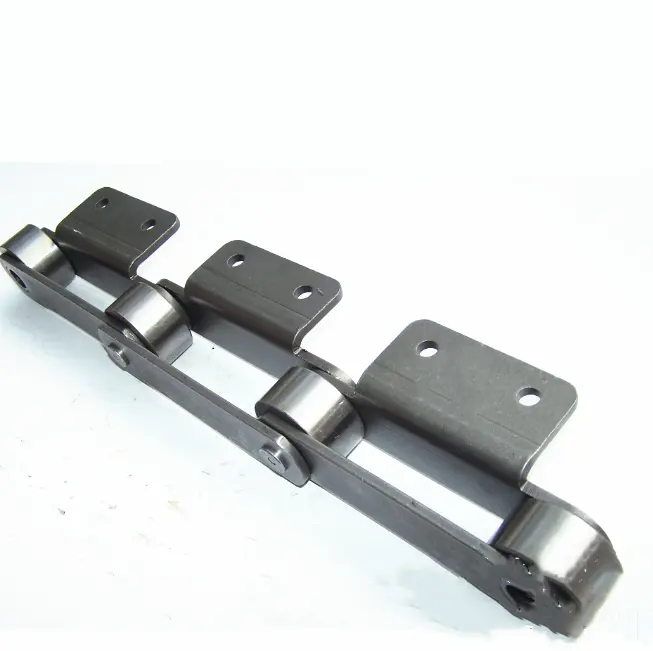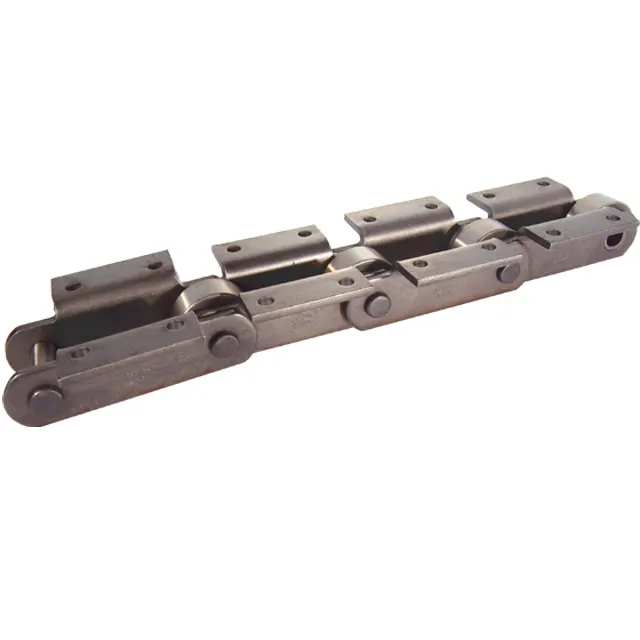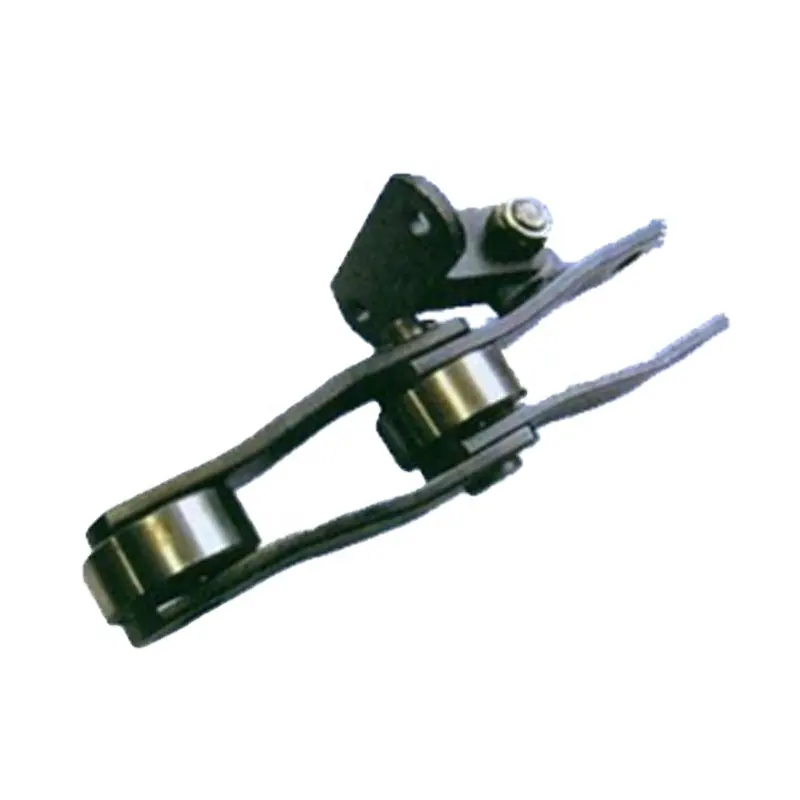Product Description
Product advantages:
| — Ten CoreTechnologies — | |||
| 1 | Chain strengh preload technology | 2 | Pin CRV treatment technology |
| 3 | Plate smoothly punching technology | 4 | Bush oil hole technology |
| 5 | Vacuum Oiled Technology | 6 | Precision Punching Technology |
| 7 | Low frequency fatigue test technology for lange size chain | 8 | Chain length comparison technology |
| 9 | Variation of silence design technology | 10 | Chain dynamic testingtechnology technologies |
Our Advantages:
1. Any inquiry you make will be answered professionally within 6~8 hours.
2. Attaches great importance to product quality and approved by many global quality system certification,such as France, Norway, Germany.
3. Focused on Chain since 1999, have rich experience in Production.
4. High-quality workers,First-class advanced equipment,good quality control,advanced technology.
5. Be Good at Custom-Made Products, provide customized services for customers.
6. Participated in the drafting of 24 national and industrial standards such as chains.As of 2571-Mar, CHOHO has 180 authorized patents.
7. With the responsibility of “Providing high quality chain system with the same service life for the global locomotive industry”, have established a strong R&D team.
By 2571,CHOHO has more than 2,7.
-CHOHO has 4 subsidiaries, including testing technology and international trading companies. has 4 factories in HangZhou, Thailand factory, ZheJiang R&D Center and Tokyo R&D Center. In addition, CHOHO ZHangZhoug Industrial zone is expected to be completed & put into operation next year.
-We specialized in producing all kinds of standard chains and special chains, such as Agricultural Chain, Sprocket, Chain Harrow, Tillage Parts,Rice Harvester Chain, GS38 Chain, Roller Chain, Automobile Chain, Motorcycle Chain Industrial Chain and so on.Our partners among world top enterprises, such as LOVOL,JOHN DEERE,NEWHOLLAND, CLASS,AGCO,DEUTZFAHR,HONDA, KUBOTA etc.
FAQ:
1. Are you manufacturer or trade Company?
We are a factory focused on producing and exporting Chain over 23 years,have a professional international trade team.
2. What terms of payment you usually use?
T/T 30% deposit and 70% against document, L/C at sight
3. What is your lead time for your goods?
Normally 30~45 days.Stock can be shipped immediately.
4. Do you attend any Show?
We attend Hannover show in Germany, EIMA in Italy, CHINAMFG in France, CIAME in China and many other Agricultural machinery shows.
5.Do you offer free samples?
Yes,we can.or you just bear the shipping cost.
6.Is OEM available?
Yes, OEM is available. We have professional designers to help you design.
/* March 10, 2571 17:59:20 */!function(){function s(e,r){var a,o={};try{e&&e.split(“,”).forEach(function(e,t){e&&(a=e.match(/(.*?):(.*)$/))&&1
| Standard or Nonstandard: | Standard |
|---|---|
| Application: | Conveyer Equipment, Agricultural Machinery |
| Surface Treatment: | Polishing |
| Samples: |
US$ 1/Meter
1 Meter(Min.Order) | Order Sample |
|---|
| Customization: |
Available
| Customized Request |
|---|
.shipping-cost-tm .tm-status-off{background: none;padding:0;color: #1470cc}
| Shipping Cost:
Estimated freight per unit. |
about shipping cost and estimated delivery time. |
|---|
| Payment Method: |
|
|---|---|
|
Initial Payment Full Payment |
| Currency: | US$ |
|---|
| Return&refunds: | You can apply for a refund up to 30 days after receipt of the products. |
|---|

How do mill chains handle material flow and transfer in bulk handling applications?
Mill chains are specifically designed to handle material flow and transfer in bulk handling applications with efficiency and reliability. These chains are widely used in various industries, such as agriculture, mining, construction, and more, where bulk materials need to be transported in large quantities. Here’s how mill chains achieve material flow and transfer:
1. Robust Construction: Mill chains are constructed using high-quality materials, such as alloy steel, which provides excellent strength and durability. Their robust design allows them to handle heavy loads and withstand the stresses of continuous material transfer.
2. Precise Alignment: The design of mill chains ensures precise alignment between the chain and sprockets. This alignment helps to maintain a smooth and consistent material flow, reducing the risk of jams or blockages in the system.
3. Flexibility: Mill chains are flexible enough to adapt to various conveyor configurations, including inclined or declined conveyors. This flexibility enables them to efficiently transport materials across different terrains and elevations.
4. Low Friction: Mill chains are designed to minimize friction during operation. This low friction characteristic reduces the energy consumption and wear on the chain, resulting in a longer service life and improved material transfer efficiency.
5. Adaptability: Mill chains are suitable for handling a wide range of bulk materials, including grains, aggregates, ores, coal, wood chips, and more. Their adaptability makes them a versatile choice for different industries.
6. Conveyor Systems: In bulk handling applications, mill chains are commonly used in conveyor systems. These systems utilize rotating sprockets to move the chain, and the material is carried along the conveyor’s path, ensuring a continuous flow of materials from one point to another.
7. Bucket Elevators: Mill chains are often employed in bucket elevators, which lift and transfer bulk materials vertically. The buckets attached to the chain scoop up the material and discharge it at the desired location, providing an efficient material handling solution.
Overall, mill chains are essential components in bulk handling applications, ensuring the smooth and consistent flow of materials in various industrial processes. Their reliable performance, strength, and adaptability make them a preferred choice for material transfer in many industries.

What are the temperature limits for mill chains in various environments?
Mill chains are designed to operate within specific temperature ranges depending on the materials they are made of and the intended application. The temperature limits for mill chains can vary based on the environment in which they are used. Here are some common temperature limits for mill chains in various environments:
- Ambient Temperature: Mill chains made of standard carbon steel or stainless steel can typically handle ambient temperatures ranging from -20°C to 150°C (-4°F to 302°F). These chains are commonly used in general material handling applications and conveyor systems.
- High-Temperature Environments: For applications involving high temperatures, such as in steel mills or foundries, mill chains made of heat-resistant materials like alloy steel or specialty coatings can withstand temperatures up to 600°C (1112°F) or more.
- Low-Temperature Environments: In cold storage facilities or freezing environments, mill chains made of materials with low-temperature resistance may be used. These chains can handle temperatures as low as -40°C (-40°F) or even lower.
- High-Temperature Furnace Applications: For use in kilns, ovens, or furnaces in industrial processes, mill chains with specialized heat-resistant materials can endure temperatures exceeding 1000°C (1832°F).
- Chemical and Corrosive Environments: Mill chains used in chemical processing plants or corrosive environments may be constructed with materials such as stainless steel or plastic, which can withstand the specific chemical conditions and temperature ranges associated with those applications.
It is crucial to select the appropriate mill chain based on the temperature requirements of the intended application. Using chains outside their temperature limits can lead to premature wear, decreased performance, and potential safety hazards. Regular maintenance and lubrication are essential to ensure mill chains operate optimally and have a longer service life in their respective temperature environments.

What are the maintenance requirements for mill chains to ensure optimal performance?
Proper maintenance is essential to ensure the optimal performance and longevity of mill chains. Regular inspections and care help identify and address potential issues early, preventing costly downtime and equipment failures. Here are the key maintenance requirements for mill chains:
1. Regular Inspections:
Perform routine visual inspections of the mill chains to check for signs of wear, damage, or misalignment. Look for elongation, excessive wear on pins and bushings, and any loose or broken components.
2. Lubrication:
Ensure proper lubrication of the mill chains. Lubrication reduces friction and wear, dissipates heat, and prevents corrosion. Follow the manufacturer’s recommendations for lubrication intervals and use the appropriate lubricant for the specific operating conditions.
3. Cleaning:
Regularly clean the mill chains to remove dirt, debris, and accumulated particles. Clean chains function better and reduce the risk of abrasive wear.
4. Tension Adjustment:
Maintain the correct tension in the mill chains. Improper tension can lead to premature wear, elongation, and failure. Refer to the equipment’s manual or consult with the manufacturer for the appropriate tensioning procedure.
5. Replacement of Worn Components:
Replace any worn, damaged, or broken components promptly. This includes pins, bushings, rollers, and any other parts that show signs of wear. Using worn-out components can lead to chain failure and damage to other parts of the machinery.
6. Environmental Considerations:
Take into account the operating environment and make any necessary adjustments to maintenance procedures. In harsh or corrosive environments, additional protective measures, such as coatings or seals, may be necessary.
7. Regular Training:
Ensure that maintenance personnel are well-trained in handling mill chains. Proper handling and installation can significantly impact the chain’s performance and lifespan.
8. Record-Keeping:
Maintain detailed records of maintenance activities, including inspections, lubrication schedules, and component replacements. These records can help identify patterns, track chain performance, and plan future maintenance tasks.
By adhering to these maintenance requirements, operators can optimize the performance and service life of mill chains, reducing downtime and improving overall efficiency in material handling and industrial applications.


editor by CX 2023-12-22